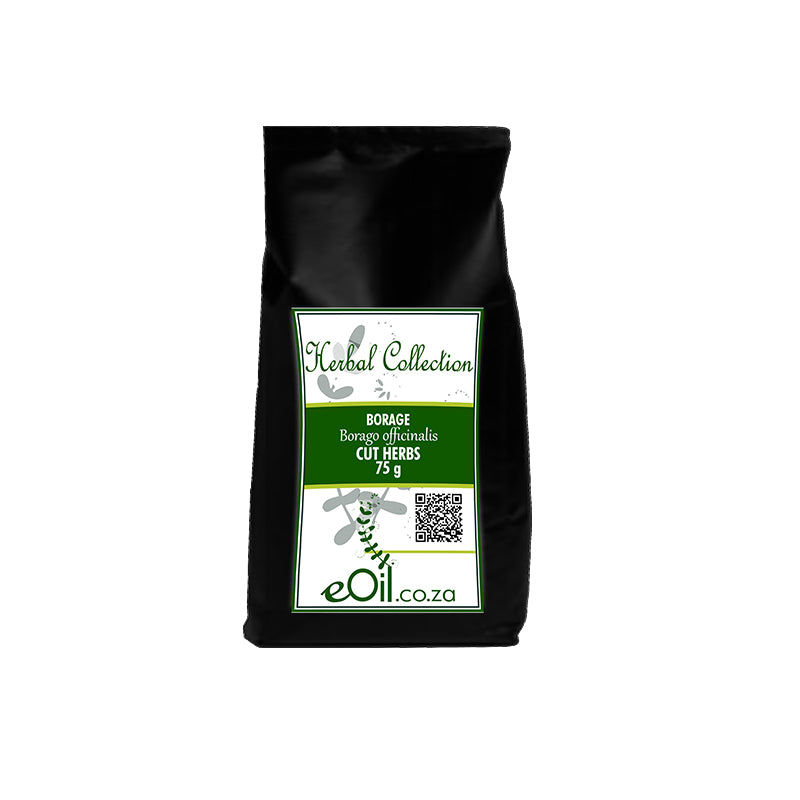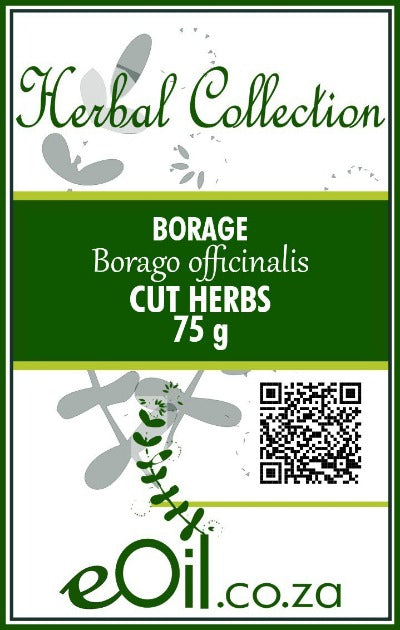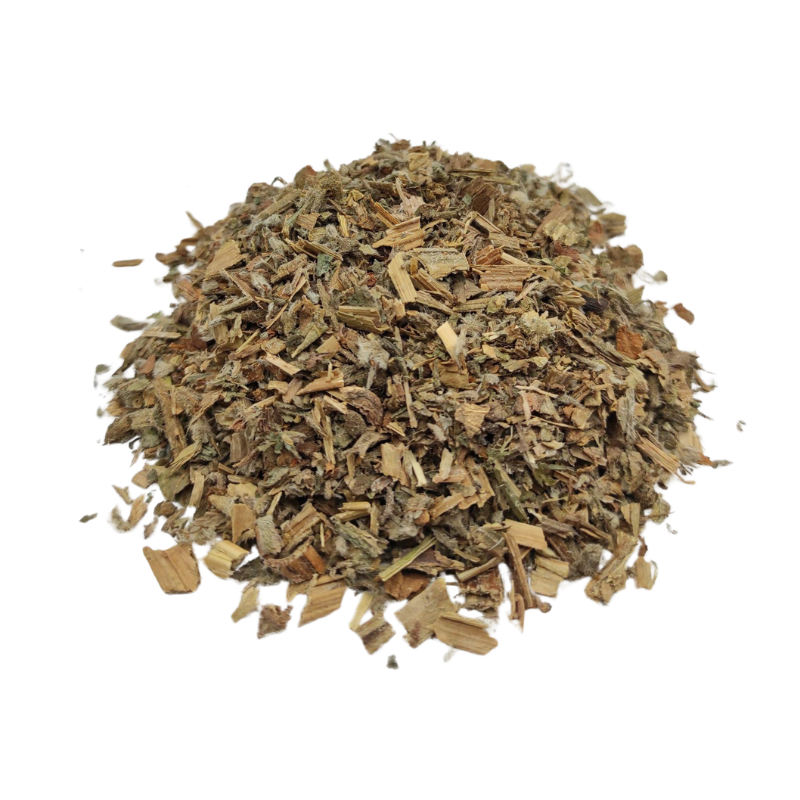Borage Herb Cut - Herbal Collection
Borage Herb Cut - Herbal Collection - 75 GR is backordered and will ship as soon as it is back in stock.
Description
Description
In traditional herbalism, Borage herb is used as a restorative tonic for the adrenal glands. It is the "go-to" herb for rebuilding strength after a long illness, combating deep exhaustion, and lifting the spirits during times of grief or stress.
Key Benefits & Uses:
Adrenal Support & Burnout: This is its #1 traditional use. It is known as a restorative tonic for "worn out" systems. It is used to help the body recover from the effects of chronic stress, fatigue, and overwork (adrenal exhaustion).
"The Herb of Courage" (Mood): Historically, it was added to wine to "gladden the heart." Today, it is used to help alleviate feelings of heaviness, grief, and mild depression, promoting a sense of well-being.
Respiratory Support: Borage herb is rich in mucilage. It acts as a soothing expectorant and demulcent, traditionally used to soothe dry coughs, sore throats, and chest congestion during a cold or flu.
Fevers: It has a "sudorific" action (induces sweating), which is traditionally used to help break a fever naturally.
Important Cautions:
Short-Term Use Only: Due to the presence of naturally occurring alkaloids (PAs) in the raw herb, this supplement is intended for short-term restorative use, not long-term daily maintenance.
Do NOT use if pregnant or breastfeeding.
Consult a healthcare professional if you have liver concerns.
TRADITIONALLY USED FOR
Borage (Borago officinalis), also known as starflower, is a versatile herb that has been traditionally used in various ways for its medicinal properties.
It is native to the Mediterranean region but is now widely cultivated in other parts of the world. The leaves, flowers, and seeds of the borage plant can be used to make a tisane, or herbal tea, which has numerous potential
health benefits:
Anti-inflammatory properties: Borage contains gamma-linolenic acid (GLA), an omega-6 fatty acid that has been shown to have anti-inflammatory effects. Borage tisane may help reduce inflammation and alleviate symptoms of conditions like rheumatoid arthritis, eczema, and asthma.
Stress and anxiety relief: Borage has been traditionally used as a mood-enhancing herb. It contains compounds like rosmarinic acid and choline that may help to relieve stress and anxiety and promote a sense of calm.
Respiratory health: Borage has expectorant properties, which may help in clearing mucus from the lungs and bronchial tubes, making it potentially beneficial for individuals with respiratory issues like colds, coughs, or bronchitis.
Skin health: Borage is rich in essential fatty acids that support skin health. Drinking borage tisane or using borage oil topically may help improve the appearance and texture of the skin, alleviate dryness, and promote healing of skin conditions like eczema or psoriasis.
Diuretic effects: Borage has been traditionally used as a diuretic to help flush excess fluids from the body. This can help reduce swelling and bloating and support kidney function.
Digestive health: Borage is known for its soothing properties and has been traditionally used to alleviate digestive issues like indigestion, gas, and bloating.
Cardiovascular health: The omega-6 fatty acids in borage, particularly gamma-linolenic acid (GLA), may have a positive impact on heart health by helping to reduce inflammation and improve blood circulation.
Hormones imbalance : Borage may help regulate hormonal balance, particularly in women, by supporting the healthy production of prostaglandins, hormone-like substances that play a role in various bodily functions.
INFORMATION
Source : http://www.wikiphyto.org/wiki/Bourrache
Reference on http://www.wikiphyto.org
Translation in English by Google Translate (go to the page of the source linked | on Chrome cellphones go on the 3 dots on the top right and select translate in your preferred language | on laptop right click your mouse and select option translate when hoovering on the page
plant name
Borage, beef tongue
International Latin denomination
botanical family
Boraginaceae
Description and habitat
- Herb to 50 cm tall, with rough, prickly hairs all over its surface, branching hollow stems, rough oval leaves, flowers with sharp, blue petals surrounding a conical bundle of black anthers Seeds contained in dehiscent tetrakenes but the seed yield is random (unsynchronized flowering)
History and tradition
- Officinale by its flowers and flowering tops but beware of pyrrolizidine alkaloids
- Cultivated for the production of its oil-rich seeds
Parts used
- Seeds, flowers and flowering tops
Dosage forms available
- Borago officinalis mother tincture whole plant
Usual dosages
Composition
Main components of the plant
- Mucilages , allantoin , flavonols and potassium salts
- Pyrrolizidine alkaloids : lycopsamine , amabiline , supinine
- Anthocyanins in flowers
- Oil of variable yield 13 to 33% with polyunsaturated fatty acids:
- Omega-6:
- Linoleic acid (30 - 40%) gamma-linolenic acid (20 - 40% depending on origin)
- Others :
- Oleic acid (15 - 19%)
- Palmitic acid (10%-11%), stearic acid (3.5%-4.5%), eicosanoic acid (3.5%-5.5%), erucic acid (1.5%-3.5%)
- Omega-6:
Main components of buds or young shoots
Main components of essential oil
Properties
Plant properties
- Antitussive, expectorant, emollient (mucilage), diaphoretic
- Laxative (mucilage)
- Healing ( allantoin ) externally
- Diuretic ( flavonols and potassium salts)
- Anti-oxidant (de-oiled seeds) [1]
- Oil rich in gamma-linolenic acid [2] omega-6, hypocholesterolemic, anti-platelet aggregation
- Nutritional supplementation with omega-6 essential fatty acids (omega-6 EFAs) is of potential interest in the treatment of atopic dermatitis (the hypothesis being that patients with atopic dermatitis have reduced activity of the enzyme delta-6 -desaturase), and borage oil would be more interesting than evening primrose oil because it contains two to three times more gamma-linolenic acid [3]
Bud properties
Properties of essential oil
Directions
Indications of the whole plant (phytotherapy)
- The plant itself is unusable due to its hepato- and nephrotoxic pyrrolizidine alkaloids
- The flowers are sometimes eaten to decorate salads, they would be reassuring
- The seed oil is used in various ailments such as multiple sclerosis, diabetes, cardiovascular diseases, eczema [4]
- Rheumatoid arthritis ( gamma-linolenic acid : 2.8 mg of GLA per day) [5]
Indications of the bud (gemmotherapy)
Specific indications of essential oil (aromatherapy)
Known or suspected mode of action
- Oil extracted by cold pressing
Usual formulations
- Herbal tea of 5 flowers of Jean Valnet:
- Lavender flowers ( Lavandula vera ) 20 grams
- Wild pansy flowers ( Viola tricolor ) 20 grams
- Marigold flowers ( Calendula officinalis ) 10 grams
- Broom flowers ( Cytisus scoparius or Sarothamnus scoparius ) 10 grams
- Borage flowers ( Borago officinalis ) 10 grams
- 1 pinch for a cup. Infusion of a few minutes, one cup two to three times a day, by discontinuous cures
Regulations
- French Pharmacopoeia list A (aerial part, flower)
Possible side effects and precautions for use
- Hepatotoxicity and mutagenicity of pyrrolizidine alkaloids
- No use of the plant per os (except flowers occasionally)
- The seed oil is harmless
Bibliographic references
- Aller↑ Mahinda Wettasinghe, Fereidoon Shahidi. Antioxidant and free radical-scavenging properties of ethanolic extracts of defatted borage (Borago officinalis L.) seeds. Food Chemistry, Volume 67, Issue 4, December 1999, Pages 399–414
- Aller↑ S Stymne, AK Stobart. Biosynthesis of gamma-linolenic acid in cotyledons and microsomal preparations of the developing seeds of common borage (Borago officinalis). Biochem J. 1986 December 1; 240(2): 385–393. [1]
- Aller↑ Foster RH, Hardy G, Alany RG. Borage oil in the treatment of atopic dermatitis. Nutrition. 2010 Jul-Aug;26(7-8):708-18. doi: 10.1016/j.nut.2009.10.014. PMID 20579590
- Aller↑ Asadi-Samani M, Bahmani M, Rafieian-Kopaei M. The chemical composition, botanical characteristic and biological activities of Borago officinalis: a review. Asian Pac J Too Med. 2014 Sep;7S1:S22-8. doi: 10.1016/S1995-7645(14)60199-1. PMID 25312125
- Aller↑ Zurier RB, Rossetti RG, Jacobson EW, DeMarco DM, Liu NY, Temming JE, White BM, Laposata M. Gamma-Linolenic acid treatment of rheumatoid arthritis. A randomized, placebo-controlled trial. Arthritis Rheum. 1996 Nov;39(11):1808-17. PMID 8912502
- Kathryn M. Larson, Mark R. Roby, Frank R. Stermitz. Unsaturated Pyrrolizidines from Borage (Borago officinalis), a Common Garden Herb. J.Nat. Prod., 1984, 47 (4), pp 747–748
- SPJN Senanayake, F. Shahidi. Chemical and Stability Characteristics of Structured Lipids from Borage (Borago officinalis L.) and Evening Primrose (Oenothera biennis L.) Oils. Journal of Food Science, Volume 67, Issue 6, pages 2038–2045, August 2002
CAUTION
Store in a cool, dry place, away from light. Keep tightly closed, away from the reach of Children and pets.
Do not exceed the daily dose.
This product is not intended to prevent or cure any form of illness or disease.
If you are pregnant or nursing ; If you have a medical condition or are in the course of medical treatment ; If you are programmed for theater/operation in the near future, please consult your healthcare practitioner before using this product.
This product cannot replace a varied and balanced diet and a healthy lifestyle.
This product has not been evaluated by the SAHPRA for its quality, safety or intended use.
For More Information please check our General Safety Herbal products Page

Borage Herb Cut - Herbal Collection - 75 GR is backordered and will ship as soon as it is back in stock.





